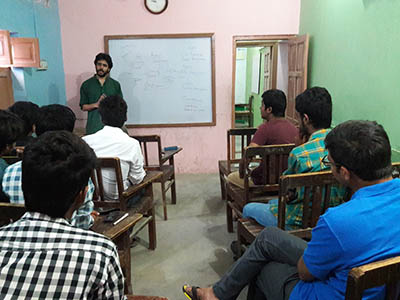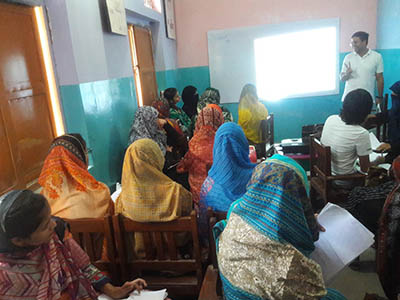The possibilities known yet unknown
- By
Ajay Pinjani & Jaffar Mujtaba
-
Saturday, October 1, 2016
"Sir, if my aim in life is achieved, what do I do?" The question asked during a discussion on Career options with Matriculation and Intermediate students in Tando Jam, revealed a level of ambition which would make most envious.
Visiting Tando Jam has always been a different kind of learning experience. Being positioned between Hyderabad and interior Sindh, the place enjoys a unique geographical position, acting like a ligament that holds urban and rural Sindh together. This is reflected in its young population, who have the same ambitions as any urban youth, but still enjoy a strong sense of community. However, instead of getting the best of both worlds, our individual and national priorities have left the town in a tug-of-war between the opportunities offered by the cities on one side, and the lack of resources and rigid obedience to traditions on the other.
The horribly maintained thin lanes and cramped markets seem like any densely-populated "Colony" in Pakistan's urban centers, only with a lower crime rate (at least at present). A walk around the small town reveals people with Masters degrees sitting jobless and dejected, and parents insisting that their children aim for clerical government jobs as they offer "stability". However, engagement with the community youth brings about hope that the present situation may only be transitory.
Coming back to the aforementioned discussion, it began with cliche questions of careers and goals, with everyone mentioning their dreams of becoming engineers, doctors and CSS Officers. However, as it ventured into the underlying aspects of education and professional life, students started sharing some wonderfully complicated concerns. Some hesitant hands stood out and what followed were questions about choices, confusion and challenging tradition. "I meet so many people and hear about so many options - I feel confused"; "If I have to respectfully disagree about academic choices with those I respect, what and how do I do it?". Although revealing a hidden frustration and anxiety, the questions were heartening and encouraging as they showed that despite our society's best efforts, we have still not been able to stop our children from thinking and dreaming beyond what they are told and shown.
Another discussion with local community youth pursuing higher education was enlightening. It began with the question of whether the town's youth should be engulfed in the government machinery which shadows the rural areas of Sindh or adopt the flow of the emerging markets in its urban centers. When the conversation was narrowed down to 'needs' and 'opportunities', although the participants appreciated the complexities brought about by the different demographics, they concluded that the division of urban and rural is not so rigid and the features that encourage intervention and innovation in societies remain true for all situations. The conversation then chartered towards community building, and despite an acknowledgment of the resistance experienced during the process, there was a drive to go beyond and improve both their individual lot and that of the society around them.


A way to respond to the resistance was contained in a question raised during a community-engagement art activity with female students and teachers of the town, an activity for which some of the participants had to argue at home to attend. One of the participants asked, "If people around me criticize my attempts and contribution to improve my community, how do I use that criticism positively?" The girl who asked the question was oblivious about the magical solution she herself had mentioned within the question itself - the hard won attitude to approach situations positively regardless of the negative vibe they entail.
Everyone is affected by the tumultuous changes in the socio-economic, technological and political environment around us. However, different situations lead to different reactions, and if not given proper direction, some of these reactions end up being threatening and tragic. Many in our society may have once had the same anxious hopes and ambitions described above, but circumstance led them into taking a path which feeds the negativity which is slowly making us all cynical regardless of our place and position in society.
The case for Tando Jam may be applied to any under-resourced settlement within or touching Pakistan's urban centers, overflowing with untapped potential. Now, more than any time in the past, it is essential to create support systems for capacity building, counseling, youth engagement and other similar measures to ensure that the potential of this country is harnessed towards something positive. We also stand to learn a thing or two in the process, as one thing the youth of these communities is not under-resourced in is hope and a continuous drive towards something better. However, a lack of counseling guidance, and assistance can slowly eat away this potential, in which case we should not be surprised when they react in "un-positive" ways.